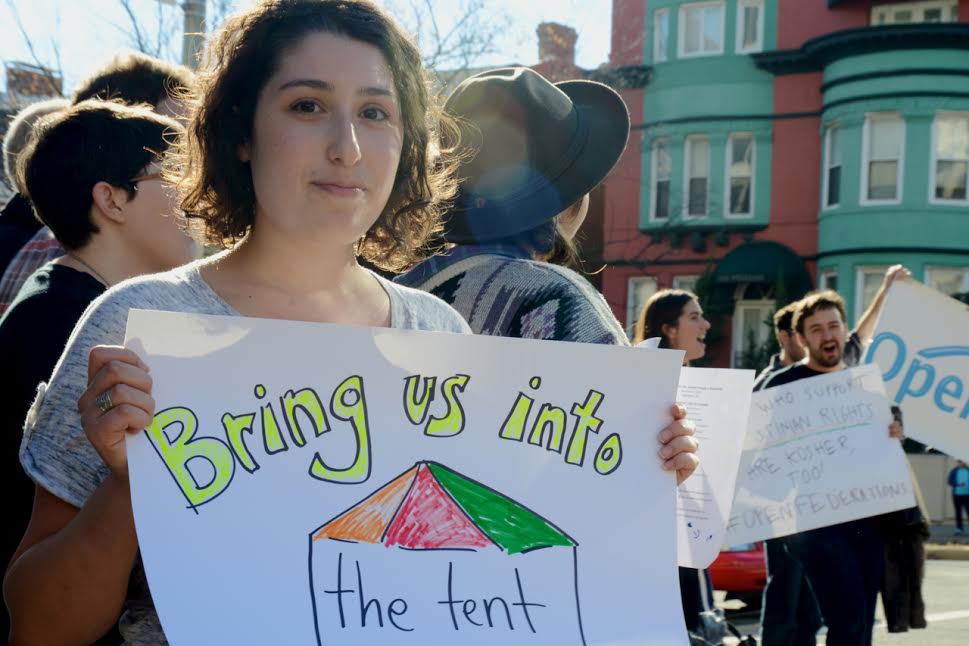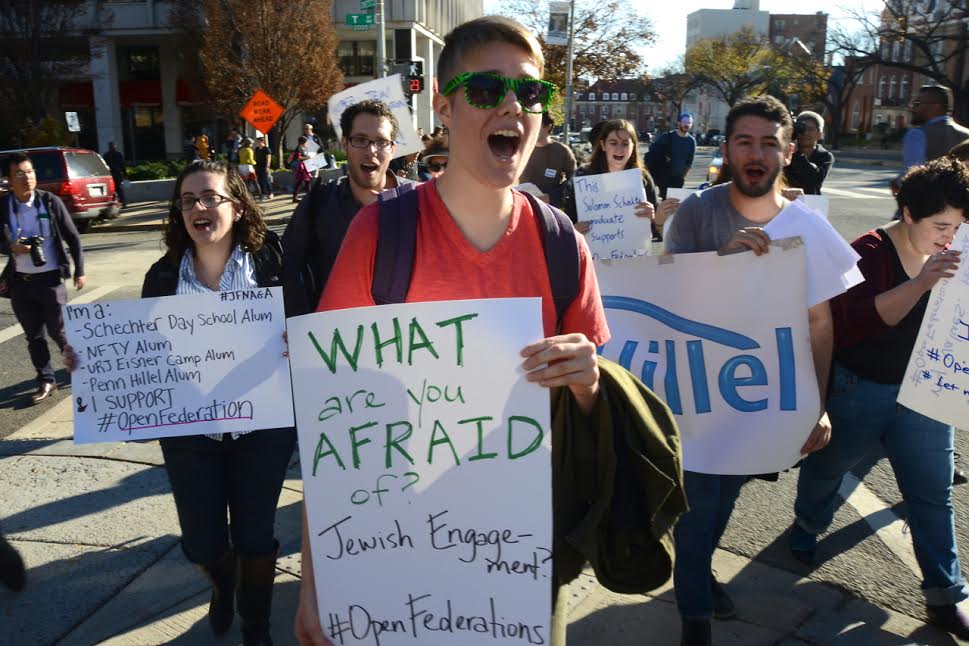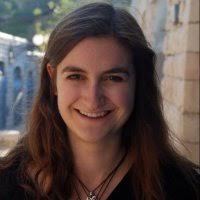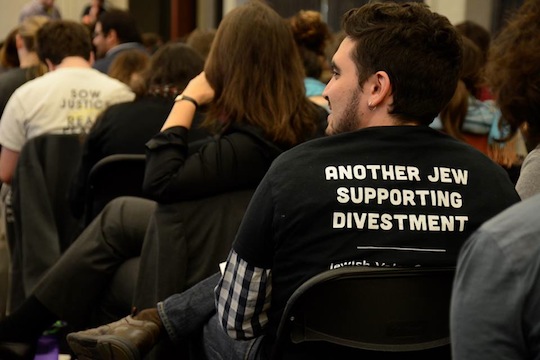The Jewish American establishment has been trying to dictate the confines of the conversation on Israel and Palestine on college campuses in the United States. One group of young Jews is trying to ensure their voices are being heard, despite the red lines being drawn around them, by leveraging communal pursestrings.
By Tom Pessah

On November 8, dozens of young American Jews traveled to Washington D.C. to participate in a groundbreaking protest outside the General Assembly of the Jewish Federations of North America, where they protested the lack of support for young Jews who want to broaden the conversation around Israel and Palestine.
I spoke to Rachel Sandalow-Ash, 22, one of the founders of Open Hillel — a student-run campaign that encourages inclusivity and open discourse on Israel/Palestine at campus Hillels, the largest Jewish campus organization in the world — and one of the organizers of the protest, about democracy in the American Jewish community, the role of donors, and the hopes of young Jews like her.
How did Open Hillel start?
In the fall of 2012 Harvard Hillel forbade the Harvard College Progressive Jewish Alliance from co-sponsoring an event with the Harvard College Palestine Solidarity Committee inside the campus Hillel. We had tried to host an event with them called “Jewish Voices against the Occupation,” which was going to feature two speakers, one Jewish-American and one Jewish-Israeli, both of whom had been involved in nonviolent protests against home demolitions in the West Bank. We wanted to hold this event at Hillel, because we thought it was important for Jewish students to hear about the occupation of the West Bank: and because the speakers were specifically going to address the connections between their activism and their Jewish identities.
Just before the event, our Hillel director got calls from the Combined Jewish Philanthropies, the Jewish Federation of Greater Boston, and from Hillel International, telling him that this event could not proceed at Harvard Hillel because the Palestine Solidarity Committee, our co-sponsor, supported boycotts, divestment and sanctions against Israel. Our director told us that Harvard Hillel could lose up to a million dollars if this event was to proceed. He pointed to Hillel International’s Standards of Partnership for Israel activities, which state that Hillel “will not partner with, house, or host” organizations, groups, or speakers that are deemed to “delegitimize, demonize, or apply a double standard” to Israel or support boycotts, divestments, or sanctions of Israel.
How did you respond?
I grew up in the Jewish community. I went to Jewish day school, Jewish summer camp, a conservative synagogue. I spent my whole life only hearing one narrative and one set of perspectives. When I came to college and joined the Progressive Jewish Alliance, I learned for the first time about Palestinian narratives, about the occupation, about all these sorts of issues. Hillel’s decision to bar this event was a very deliberate attempt to prevent voices deemed too critical of Israel from having a place at Hillel, and to prevent Jewish students from engaging with these criticisms of Israeli policy.
We looked more closely at Hillel’s Standards of Partnership and realized the rules exclude large numbers of people. Not only do the Standards prevent Jewish-Palestinian partnerships, but anyone and everyone (including Jewish students and Jewish student groups) deemed too critical of Israel and Israeli policy could be said to “delegitimize” or “apply a double standard” to Israel, and thus could be barred from Hillel and the Jewish campus community.
We got in touch with students from other schools and asked whether they were having these problems at their Hillels. The answer was yes. No one was allowed to work with Palestinian groups or bring in speakers who were deemed too critical of Israel. This censorship was present at nearly every school, because the orders came down from Hillel International, and were enforced by nearly all the local federations.
It’s important to remember that Hillel is the umbrella organization for Jewish life on 550 campuses, and bills itself as a pluralistic Jewish space. It actively welcomes students from different religious streams and denominations and encourages all different ways of connecting with Judaism and Jewish identity. But when it came to Israel-Palestine politics, Hillel’s policies created a Jewish community that was closed off to dissent, that was not pluralistic at all.
This led to the creation of Open Hillel?
Yes. When Hillel barred our event, the Harvard College Progressive Jewish Alliance started the Open Hillel campaign, which soon became national in scope. Our goal continues to be to eliminate Hillel International’s Standards of Partnership for Israel activities. Over the course of this campaign, we’ve built a lot of student excitement and interest. At several schools where the Hillels were relatively independent financially, the students declared the Hillels “open,” saying they would not abide by the organization’s policies and instead would welcome all views. We held a conference, ran a speaking tour, and circulated a number of petitions. We have received outpourings of support not just from Jewish students, but also from community members, professors, rabbis, and other Jewish leaders.
Yet at nearly every meeting we’ve had with local or national Hillel staff, we’ve been told some version of: “Sorry, we can’t change our policies. If we have these kinds of critical conversations, we will lose money. Hillel will not be funded.”
Where do these institutions get their funding from?
Much of it comes from private donors, and there’s not really anything we can do about that other than get new donors. But a lot of this funding comes from the Jewish Federations of North America. The Jewish Federations were, and continue to be, a communal philanthropy. They fund everything in the Jewish world – Jewish day schools, Hillels, summer camps, synagogues, a whole bunch of social service programs. They bill themselves as the central address of North American Jewry, and are supposed to have some kind of accountability to the communities they serve.
We have found that the Federations use their position of power and influence to crack down on open debate in Hillel and in other local Jewish communities by threatening to withhold funds should they work with a Palestinian group. From what we understand, the Jewish Federations of North America started discussing these restrictions on funding back in 2010 — the same year Hillel International adopted its Standards of Partnership. The Federations founded the Israel Action Network, their national project which devotes itself to combating “de-legitimization of Israel” and spends time and money enforcing Hillel’s Standards of Partnership and similar red lines at other Jewish institutions.
What was the purpose of the ‘Jewish People’s Assembly’ last month?
The Jewish People’s Assembly sought to bring together a coalition of Jewish students and community members to call upon the Federations to stop conditioning their support for Jewish life on Jewish institutions’ adherence to red lines around Israel/Palestine.
We called our gathering the Jewish People’s Assembly to highlight the ways in which the Jewish Federations prioritize their wealthy donors over Jewish community members. Our protest took place outside the annual General Assembly of the Jewish Federations of North America in Washington, D.C., which featured sessions on topics such as, “how to connect with high-value donors,” “how to get corporate sponsorship for your Jewish community,” “how to promote a ‘healthy’ discourse on Israel” and “how to fight BDS.” What we’re seeing inside the General Assembly is a set of priorities that are largely focused on appealing to mega-donors and promoting a narrow vision of what the Jewish communal conversation on Israel should look like.
We are calling upon the Jewish Federations to be accountable to all Jewish community members, not just a wealthy few who want to force their own political views on the entire community.
To what extent is this a Jewish problem?
I don’t think this is a problem unique to the American Jewish community. I think it is a problem that’s endemic to American society at large. I think that what we are seeing throughout the U.S. is a situation in which small groups of wealthy people hold disproportionate power. This is true in the country as a whole, and it’s true in our community. What we’ve seen in our community is that people abuse that power to curtail free speech and voices with whom they disagree. We are trying to fight back against this trend and create Jewish communities that are more open and more democratic.
How are young Jews getting involved in this issue?
Young Jews or millennials are far more critical of Israeli policy than their parents and grandparents; we’re far more likely to be sympathetic to various calls to end the occupation and promote human rights for Palestinians. Frankly, young Jews are alienated by Jewish institutional policies that say that one cannot have difficult conversations, that one cannot criticize Israel or work with anyone who supports BDS — a group that includes most Palestinians.

Peter Beinart writes really compellingly about this topic. He explains that when young Jews see a conflict between their values and what they see in Jewish communities, they’ll choose their values. There are a lot of young Jews who still fall within the broadly-defined spectrum of acceptable opinion, but are also committed to the liberal values of pluralism, open debate, and engaging with the views of those with whom they disagree. When they see that the Jewish community doesn’t provide a space for that, they are going to feel deeply alienated. That’s what we have been seeing for three years with Open Hillel.
How did you approach the Federations?
At the Assembly, we read out a letter to the Federations’ leadership, calling on them to state clearly and publicly that neither the national organization nor the local Federations will condition their support for Jewish communities on adherence to red lines on Israel/Palestine. Caroline Morganti, the Internal Coordinator at Open Hillel went inside to deliver the demands. She tried to drop them off at the reception desk to pass along the leadership. They said “you can’t drop that off here,” then security guards came and told her she could not pass around demands inside. They had also sent an email to all their attendees a few weeks before the General Assembly, saying: “We’ve heard there are going to be protesters. Don’t talk to them, don’t engage with them, don’t listen to them. Take off your badge when you leave, do not talk to these people.”
How did the regular attendees treat you?
Despite the official rhetoric, when we talked to people who were coming in and out of the GA, they were very receptive to our message. When people asked what we were protesting, we answered that we are pushing for open dialogue and pluralism. Many told us they support that.
I think we’re seeing a real disconnect between ordinary people who are engaged in Jewish institutions, and these institutions’ leadership and the donors. Because, by and large, folks in the Jewish community hold liberal values; they believe that we should engage with those with whom we disagree, that we should have a wide-ranging conversation, and that we should welcome people, regardless of their politics. But there is a slice of the Federations’ leadership that sees things very differently.
Why do you feel so passionate about this issue?
I was raised in the Jewish community, I care deeply about its future, and what we’re seeing now are policies that are pushing young people away, and are alienating and excluding people. If we want to see a vibrant and continuing American Jewish community, we need to welcome everyone. This is both a moral and a practical imperative; no one should be left out because of their politics.
When it comes to Israel/Palestine, we cannot even begin to work towards justice if we are kept ignorant. What I see is a Jewish community that is being kept deliberately ignorant. If you’re embedded in Jewish institutions, you’re likely never going to hear Palestinian perspectives. You’re never going to hear about the occupation. You’re never going to hear much other than “Israel always wants peace and everything it ever does is just and right.”
The American Jewish community is hugely important in these debates: we send tons of money and support directly to Israel, and American Jewish institutions are influential in lobbying the U.S. government to support Israel. I think we need to think about our particular position in the world and ask “do we really support Israel’s current policies? What can we do to promote justice?” But we can’t begin to answer that question until people are allowed to ask questions, to discuss, to hear other views.
It’s also important for our community to engage with other groups who may bring different perspectives to issues we care about. The fact that we cannot work with the vast majority of Palestinian groups if awful on so many levels. In discussing any issue, it is key to talk to the people who are most affected. I don’t think we could have a deep and thorough conversation about racist police violence in the U.S. that didn’t include black people and black-led organizations. I don’t think we could have such a conversation about labor rights that didn’t include workers. And I don’t think we can have a nuanced, thoughtful conversation about Israel/Palestine while deliberately excluding Palestinians. For American Jews not to talk to the people who are impacted and hurt is a disservice not only to the quality of our own conversations, but also to the possibility of building intercultural partnerships and working toward justice.
Tom Pessah is a sociologist and activist, currently studying at Tel Aviv University.



